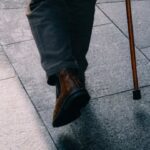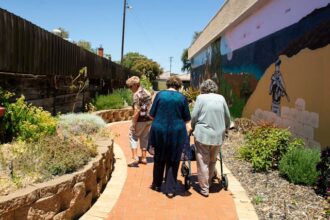A new study led by researchers at the University of Nottingham has revealed that the Covid-19 pandemic may have accelerated brain ageing in individuals, even among those who were never infected by the virus itself. Published in Nature Communications, this research highlights the profound neurological effects of the pandemic experience, suggesting that the collective stress, isolation, and upheaval during this period have left a measurable imprint on the brain. While previous research has mainly focused on the direct physiological consequences of Covid-19 infection, such as inflammation and cognitive impairment, this study shifts attention to the subtler and more widespread effects of merely living through the pandemic.
The team examined brain scans from nearly 1,000 healthy adults as part of the UK Biobank project, comparing those who were scanned both before and after the pandemic with those scanned only before the pandemic. Using machine learning techniques to estimate each participant’s “brain age” based on the structural characteristics of their brain, the researchers found that the brains of those scanned post-pandemic appeared significantly older than expected for their chronological age. This was not linked directly to infection with the virus in many cases, suggesting that the environmental and psychological impact of the pandemic itself may have driven this acceleration in brain ageing.
Interestingly, the effect was most prominent in older adults, men, and individuals from more socioeconomically disadvantaged backgrounds. This pattern mirrors other findings across the social sciences during the pandemic, where vulnerability to stress and negative outcomes has consistently been higher among certain groups. These results point to the idea that inequalities in access to healthcare, stable housing, and social support may not only influence physical health outcomes but may also extend to neurological resilience. The intersection of age, gender, and socioeconomic status may have left some individuals more neurologically exposed to the impact of prolonged stress and isolation.
While participants who had contracted Covid-19 between their two scans showed measurable reductions in cognitive performance—particularly in mental flexibility and processing speed—these deficits were not observed in uninfected individuals. This distinction suggests that the brain-ageing effect linked to the pandemic environment may not necessarily produce noticeable cognitive symptoms on its own. The structural changes in the brain might be subtle and, crucially, reversible. The authors of the study are optimistic about the brain’s ability to recover, particularly if mitigating strategies are employed to support mental and neurological health in the aftermath of collective trauma.
Dr Ali-Reza Mohammadi-Nejad, who led the study, expressed particular surprise at the finding that even non-infected individuals experienced marked increases in brain ageing rates. His comment—“It really shows how much the experience of the pandemic itself, everything from isolation to uncertainty, may have affected our brain health”—captures the central implication of the research: that the mental strain of enduring a global crisis has far-reaching biological consequences. This understanding reinforces the growing awareness that brain health is intricately tied to environmental context and lived experience, not just biological disease.
Senior author Professor Dorothee Auer and co-lead author Professor Stamatios Sotiropoulos both emphasised the unique opportunity the UK Biobank provided in allowing researchers to track neurological changes over time using high-resolution MRI data. The brain age model used in the study was developed from a pool of over 15,000 healthy individuals, ensuring that the estimates were reliable and free from the confounding effects of pre-existing illness. Their findings underscore how rare it is to have access to such well-timed longitudinal data—and how valuable such resources are in understanding the brain’s response to societal upheaval. Moreover, this evidence lays the groundwork for further research into whether these age-related changes persist or diminish over time.
Ultimately, this study serves as a sobering reminder that public health crises do not only affect people at the level of physical infection or mortality. The psychological and neurological toll of extended stress, disrupted routines, and social disconnection may quietly shape our brains in ways that are only beginning to be understood. However, the potential reversibility of these changes offers hope. With appropriate mental health support, social reconnection, and targeted cognitive interventions, the brain may be capable of recovering much of what was lost. As the world emerges from the shadow of the pandemic, the focus must now turn to healing not only the body but also the mind.
More information: Ali-Reza Mohammadi-Nejad et al, Accelerated brain ageing during the COVID-19 pandemic, Nature Communications. DOI: 10.1038/s41467-025-61033-4
Journal information: Nature Communications Provided by University of Nottingham








